人教版英语八年级下册期中复习单元知识点盘点
人教版英语八年级下册期中单元知识点总结汇总

Unit 1. what’s the matter?一.重点短语归纳1. have a fever 发烧2. lie down and rest 躺下来休息3. hot tea with honey 加蜂蜜的热茶4. see a dentist 看牙医5. get an X-ray 拍X 光片6. take one’ s temperature 量体温7. sound like 听起来像8. in the same way 以同样的方式9. without thinking twice 没有多想10. have a heart problem 有心脏病11. to one’ s surprise 使....... 惊讶的12. thanks to 多亏了;由于13. in time 及时14. save a life 挽救生命15. get into trouble 造成麻烦16. right away 立刻;马上17. because of 由于18. fa ll down 摔倒19. mountain climbing 登山运动20. be used to doing sth. 习惯做某事21. run out (of) 用完;用尽22. so that 以便23. be in control of 掌管;管理24. keep on doing sth. 继续或坚持做某事25. make a decision 做出决定26. take risks 冒险27. give up 放弃二.重点句子1.What’s the matter ?是用来询问对方出了什么毛病或问题,意为“怎么了?”。
What’s the mater with you ? 你怎么啦?= What’s the trouble with you?=What’s wrong with you?= What happened to you?I have a cold / have a sore back / have a stomachache.三.语法知识1.情态动词should的用法should是情态动词,它的基本用法是必须和其他动词一起构成谓语。
人教八年级英语下册期中考试重点必背知识清单
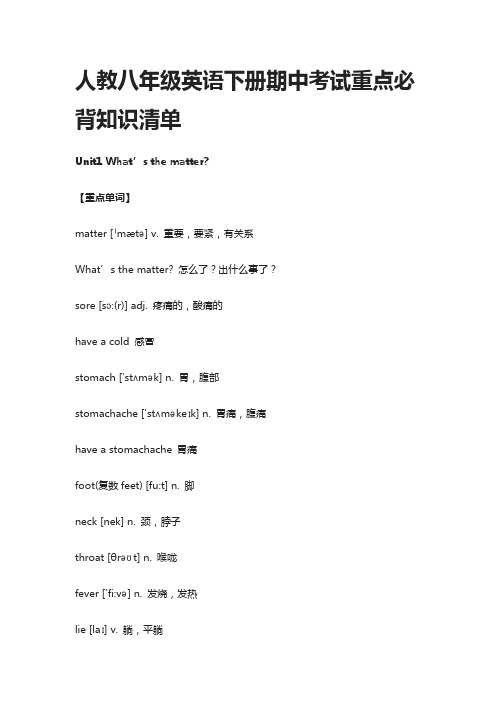
人教八年级英语下册期中考试重点必背知识清单Unit1 What’s the matter?【重点单词】matter [ˈmætə] v. 重要,要紧,有关系What’s the matter? 怎么了?出什么事了?sore [sɔ:(r)] adj. 疼痛的,酸痛的have a cold 感冒stomach ['stʌmək] n. 胃,腹部stomachache ['stʌməkeɪk] n. 胃痛,腹痛have a stomachache 胃痛foot(复数feet) [fu:t] n. 脚neck [nek] n. 颈,脖子throat [θrəʊt] n. 喉咙fever ['fi:və] n. 发烧,发热lie [laɪ] v. 躺,平躺lie down 躺下rest [rest] n. 剩余部分,其余;放松,休息cough [kɒf] n. & v. 咳嗽X-ray ['eksreɪ] n. X光,X射线toothache [ˈtu:θeɪk] n. 牙痛take one's temperature 量体温headache [ˈhedeɪk] n. 头痛have a fever 发烧break [breɪk] n. & v. 休息,暂停;打破take breaks (take a break)休息hurt [hə:t] v. 伤害,损害,使受伤passenger ['pæsɪndʒə] n. 乘客,旅客off [ɒf] adv. prep. 离开(某处);从…去掉get off 下车to one's surprise 使…惊讶,出乎…意料onto [ˈɒntə] prep. 向,朝trouble [ˈtrʌbl] n. 麻烦,烦扰,问题hit [hit] n. & v. 碰撞,打,打击right away 立即,马上get into 陷入,参与herself [hə:ˈself] pron. 她自己,她本身(she的反身代词)bandage ['bændɪdʒ] n. & v. 绷带;用绷带包扎sick [sɪk] adj. 患病的,不适的knee [ni:] n. 膝盖nosebleed [ˈnəʊzbli:d] n. 鼻出血breathe [bri:ð] v. 呼吸sunburned [ˈsʌnbɜ:nd] adj. 晒伤的ourselves [ɑ:ˈselvz] pron. 我们自己(we的反身代词)climber [ˈklaɪmə(r)] n. 登山者be used to 习惯于…适应于…risk [rɪsk] n. & v. 风险,危险;冒险take risks (take a risk) 冒险accident [ˈæksidənt] n. 意外事件;事故situation [ˌsitjuˈeiʃən] n. 状况,形式,情况kg=kilogram [ˈkɪləgræm] n.公斤,千克rock [rɔk] n. 岩石run out (of) 用尽,耗尽knife [naif] n. 刀,餐刀cut off 切除blood [blʌd] n. 血mean [mi:n] v. 意味着,意思是,意欲get out of 离开,从…出来importance [ɪmˈpɔ:tns] n. 重要性decision [dɪ'sɪʒn] n. 决心,决定,抉择control [kən'trəʊl] v. 控制,支配,操纵be in control of 掌管,管理spirit ['spɪrɪt] n. 勇气,意志death [deθ] n. 死亡give up 放弃nurse [nə:s] n. 护士【重点短语】1.have a fever 发烧2.have a cough 咳嗽3.have a toothache 牙疼4.talk too much 说得太多5.drink enough water 喝足够的水6.have a cold 受凉;感冒7.have a stomachache 胃疼8.have a sore back 背疼9.have a sore throat 喉咙痛10. take risks 冒险11.hot tea with honey 加蜂蜜的热茶12.see a dentist 看牙医13.get an X-ray 拍X 光片14.take one’s temperature 量体温15.put some medicine on sth. 在……上面敷药16. give up 放弃17. sound like 听起来像18. all weekend 整个周末19. in the same way 以同样的方式20. go to a doctor 看医生21. go along 沿着……走22. on the side of the road 在马路边23. shout for help 大声呼救24. without thinking twice 没有多想25. get off 下车26. have a heart problem 有心脏病27. to one’s surprise 另某人惊讶的是28. thanks to 多亏了;由于29. in time 及时30. make a decision 做出决定31. get into trouble 造成麻烦32. right away 立刻;马上33. because of 由于34. get out of 离开;从……出来35. keep on doing sth. 继续或坚持做某事36. put a bandage on sth. 用绷带包扎37. fall down 摔倒38. feel sick 感到恶心39. have a nosebleed 流鼻血40. cut his knee 割伤他的膝盖41. put her head back 把她的头向后仰42. have problems breathing 呼吸困难43. mountain climbing 登山运动44. be used to doing sth. 习惯做某事45. run out (of) 用完;用尽46. so that 以便47. so...that... 如此……以至于...…48. be in control of 掌管;管理49. in a difficult situation 在闲境中【重点句型】1. What's the matter with you?= What'the trouble with you?= What's wrong with you?你怎么了?2. What should she do?她该怎么办呢?3.Should I take my temperature?我应该量一下体温吗?4.You should lie down and rest.你应该躺下休息一会儿。
最全面人教版八年级下册英语各单元知识点总复习归纳总结

最全面人教版八年级下册英语各单元知识点总复习归纳总结Unit 1 How often do you exercise?词汇1. frequently 经常地2. hardly 几乎不3. ever 曾经4. once in a while 时不时5. rarely 很少语法一般现在时1. 频率副词放在动词前:I always read newspapers.2. 否定句用don't或doesn't+动词原形:I don't watch TV every day.3. 疑问句用do或does+主语+动词原形:Do you play soccer every week?Unit 2 I used to be afraid of the dark.词汇1. used to 过去常常2. get over 克服3. nervous 紧张的4. confident 有信心的5. stage 舞台语法1. Be used to+动名词表示惯或适应,I am used to studying English at night.2. Used to+动词原形表示过去常常,I used to read books every day.3. Get over+名词/代词/动名词,表示克服,She got over the flu last week.Unit 3 Could you please tell me where the restaurants are?词汇1. instruction 说明2. turn right/left 向右/左转3. excuse me 对不起4. straight 直走5. opposite 对面语法1. Could you please/could/may I+动词原形,请求礼貌地做事,Could you please help me with my English?2. Would like+名词 / 动名词,表示想要做某事,I would like to go shopping with you.3. May I ask+句子,礼貌地询问某事,May I ask where the restroom is?Unit 4 Why don't you talk to your parents?词汇1. conversation 对话2. listener 听众3. honest 诚实的4. conversation starter 聊天开场白5. effective 有效的语法1. How about/What about+动名词/名词,表示建议和提议,What about watching a movie?2. Why not+动词原形,表示建议和提议,Why not go swimming?3. Let's+动词原形,表示建议和提议,Let's have a party on the weekend.Unit 5 It must belong to Carla.词汇1. sweater 毛衣2. by accident 偶然地3. honest 诚实的4. lose 丢失5. owner 拥有者语法1. Can/Can't+动词原形,表示能力或可能性,I can dance.2. Must/Mustn't+动词原形,表示肯定或否定的推断,She must be the new teacher.3. Have/Has to+动词原形,表示必须做的事情,I have to finish my homework first.词汇1. graduate 毕业生2. physics 物理学3. ambitious 有抱负的4. career 职业5. education 教育语法一般将来时1. be going to+动词原形,表示打算做某事,I am going to see a film tonight.3. be + going to+现在进行时,表示不久会发生的事情,They are going to sing a song later.Unit 7 How do you make a banana milk shake?词汇1. recipe 食谱2. whip 打(奶油)3. peel 去皮4. slice 切片5. pour 倒语法1. What/How/Which+系动词+主语+谓语,表示特定的主语或具体的内容。
人教版八年级英语下册各单元知识点总结完整版

Unit 1 What’s the matter?一、重点短语1. have a fever 发烧2. have a cough 咳嗽3. have a toothache 牙疼4. talk too much 说得太多5. drink enough water 喝足够的水6. have a cold 受凉;感冒7. have a stomachache 胃疼8. have a sore back 背疼9. have a sore throat 喉咙痛10. lie down and rest躺下来休息11. hot tea with honey加蜂蜜的热茶12. see a dentist看牙医13. get an X-ray拍X光片14. take one’ s temperature量体温15. put some medicine on sth在……上面敷药16. feel very hot 感到很热17. sound like 听起来像18. all weekend 整个周末19. in the same way以同样的方式20. go to a doctor 看医生21. go along 沿着……走22. on the side of the road 在马路边23. shout for help 大声呼救24. without thinking twice 没有多想25. get off 下车26. have a heart problem 有心脏病27. to one’ s surprise 使……惊讶的28. thanks to 多亏了;由于29. in time及时30. save a life 挽救生命31. get into trouble 造成麻烦32. right away 立刻;马上33. because of 由于34. get out of 离开35. hurt oneself 受伤36. put a bandage on sth. 用绷带包扎37. fall down 摔倒38. feel sick 感到恶心39. have a nosebleed 流鼻血40. cut his knee割伤他的膝盖41. put her head back 把她的头向后仰42.have problems breathing呼吸困难43. mountain climbing登山运动44. be used to doing sth. 习惯做某事45. run out (of) 用完;用尽46. so that 以便47. so…that 如此……以至于……48. be in control of 掌管;管理49. in a difficult situation 在逆境屮50. keep on doing sth.坚持做某事51. make a decision做出决定52. take risks 冒险53. give up 放弃二、知识点解析1. What’s the matter? 怎么了?若是询问“某人怎么了?”要用“What’s the matter with sb.?”拓展:What’s the matter with sb.? 的同义句:What’s wrong with sb.? / What’s the trouble with sb.?2.疾病类短语:have a +疾病. e.g. :have a fever 发烧have a cold 感冒have a cough 咳嗽.have a +身体部位-ache. e.g.: have a headache 头痛have a toothache 牙痛.have a sore+身体部位. e.g.: have a sore throat咽喉痛have a sore back背痛例题:Mom, I____________.I’m sorry to hear that, dear. We must go to see the dentist right away.A. have a headacheB. have a stomachacheC. have a toothacheD. have a fever3. lie down 躺下V. 躺,平躺。
人教版八年级下册英语期中复习知识点总结
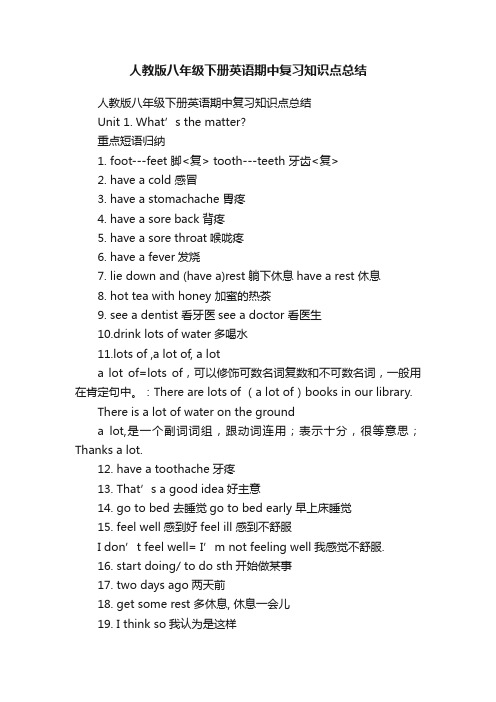
人教版八年级下册英语期中复习知识点总结人教版八年级下册英语期中复习知识点总结Unit 1. What’s the matter?重点短语归纳1. foot---feet 脚<复> tooth---teeth 牙齿<复>2. have a cold 感冒3. have a stomachache 胃疼4. have a sore back背疼5. have a sore throat喉咙疼6. have a fever发烧7. lie down and (have a)rest 躺下休息have a rest 休息8. hot tea with honey 加蜜的热茶9. see a dentist 看牙医see a doctor 看医生10.drink lots of water多喝水11.lots of ,a lot of, a lota lot of=lots of,可以修饰可数名词复数和不可数名词,一般用在肯定句中。
:There are lots of (a lot of)books in our library.There is a lot of water on the grounda lot,是一个副词词组,跟动词连用;表示十分,很等意思;Thanks a lot.12. have a toothache牙疼13. That’s a good idea好主意14. go to bed 去睡觉go to bed early 早上床睡觉15. feel well感到好feel ill 感到不舒服I don’t feel well= I’m not feeling well我感觉不舒服.16. start doing/ to do sth开始做某事17. two days ago两天前18. get some rest 多休息, 休息一会儿19. I think so我认为是这样20. be thirsty口渴21. be hungry 饥饿22. be stressed out紧张23. listen to music听音乐24. healthy lifestyle健康的生活方式25. traditional Chinese doctors传统中医26. need to do sth 需要做某事I have a toothache. I need to see a dentist. 我牙痛, 我需要去看牙医.We need to keep our classroom clean. 我们需要保持教室的干净.27. a balance of yin and yang阴阳平衡28. for example例如29. too much yin太多的阴, 阴气太盛too much + 不可数名词太多的…much too +形/副实在太… 极其,非常too many + 可数名词复数太多的…30.be good for sth./ doing sth. 对什么有益,对什么有好处be bad for sth./ doing sth. 对什么有害be good to 对…好be good at =do well in 在……方面好,擅长be good(bad) for、be good at的相关用法1.be good for 对......有益Doing morning exercises is good for your health.做早操对你们的建康有益。
八年级下册英语期中考试复习知识点梳理

八年级下册英语期中考试复习知识点梳理八下中考Unit 1-6知识梳理Unit 1 What's the matter?【语法】同义句问:XXX (with sb.)?=What’s your trouble/ matter/ problem?= What’s up? = What happens to sb.?(某人)出什么事了?=What’s wrong (with sb.)?(某人)怎么了?=Are you OK?你没事吧?=XXX?某人有什么事吗?【辨析】trouble【麻烦:make trouble】; matter【事情】;problem【难度大:solve problem】; question【难度小:ask/ answer question】答:①某人XXX.某人+have/has+a+sore+发病部位.XXX.他喉咙痛。
③某人+hurt(s)+身体部位或反身代词.XXX his XXX.他的腿受伤了。
④某部位+hurt(s).My head hurts badly.我头痛得锋利。
⑤某人+have/has+a pain+in one’s+身体部位,I have a XXX.我胸口痛。
【语法】should +动原【四个句型】【重点词汇掌握】(1)too用于一定句,句末,有逗号离隔;句中,前后都加逗号。
(2)also句中,be等助动词后,实义动词前。
(3)either用于否认句,句末,并用逗号离隔(4)neither作代词“两者都不”He is not there, _______.他也不在那儿。
She _______XXX.她也学英语。
He likes English,______.她也喜欢英语。
You may use _____book.两本书你可以随便用一本。
______answer is wrong.两个答案都不对。
I don’t like him. ______ do I.我不喜欢他。
人教版英语八年级下册下期中复习重点短语,句型全复习总结

人教版英语八年级下册下期中复习重点短语,句型全复习总结Unit 1 What’s the matter?1.have a cold感冒2. have a stomachache胃痛3. too much太多4.lie down躺下5. see a dentist看牙医6.get an X-ray拍个x光片7. take one’s temperature量体温8. put some medicine on.在…上敷些药9. have a fever发烧10. play computer games玩电脑游戏11 weekend整个周末12. take breaks/take a break休息13. without thinking twice y没多想14. go to a doctor看医生15. get off下车16. take sb. to the hospital带某人去医院17. wait for等待18. to one’s surprise使惊讶的;出乎…意料19. thanks to多亏;由于20. in time及时21. think about考虑22. have a heart problem有心脏病23. get to到达24. right away立即;马上25. get into I陷入;参与26. do the right thing做正确的事27. fall down摔倒;跌倒28. play soccer i踢足球29. put.on sth.把…放在某物上30. a few一些;几个31. come in进来32. get hit/sunburned被击中/晒伤33. be interested in对……感兴趣34. take risks/ take a risk冒险35. lose one’s life 失去生命36. because of因为37. by oneself独自;单独38. run out(of)用尽;耗尽39. cut off切除40. get out of 离开;从……出来41. ask a decision/make decisions做决定42. be in control of 掌管;管理43. go mountain climbing去爬山44. give up 放弃句型必备1. need to do sth.需要做某事2. see sb. doing sth.看见某人正在做某事3. ask sb.sth.询问某人某事4. expect sb. to do sth.期待/期望某人做某事5. agree to do sth.同意做某事6. help sb.(to) do sth.帮助某人做某事7. want to do sth.想要做某事8. tell sb. to do sth.告诉某人做某事9. have problems(in) doing sth.做某事有困难10. be/get used to doing sth.习惯于做某事11. use sth. to do sth.用某物做某事12. seem to do sth.好像做某事13. keep on doing sth.继续做某事14. mind doing sth.介意做某事Unit 2 I will help to clean up the city parks词组必备1. clean up打扫(或清除)干净2. cheer up(使)变得更高兴;振奋起来3. give/hand out分发;散发4. used to曾经……:过去5. give away赠送;捐赠6. set up建起;设立7. make a difference影响;有作用8. come up with想出;提出(主意、计划、回答等) 9. put off推迟10. put up张贴;搭建;举起11. call up打电话给(某人);征召12. help out 帮助…摆脱困境13. care for照顾;非常喜欢14. give up放弃15.try out参加…选拔;试用16. come true实现17. run out of用尽;耗尽18. take after(外貌或行为)像19.fix up修理;装饰句型必备1. need to do sth.需要做某事2. make plans to do sth.制订计划做某事3. ask sb.(not) to do sth.要求某人(不要)做某事4. used to do sth.过去常常做某事5. give up+时间+ o do sth.腾出时间做某事6. get a feeling of.产生……的感觉7. decide to do sth.决定做某事8. help sb.(to) do sth.帮助某人做某事9. make a difference to对…产生影响10. make it possible for sb. to do sth.使得做某事对某人来说成为可能11. Thank you for doing sth.因做某事而感谢你。
人教版英语八年级下册期中考试(Unit 1-Unit 5)知识点总结
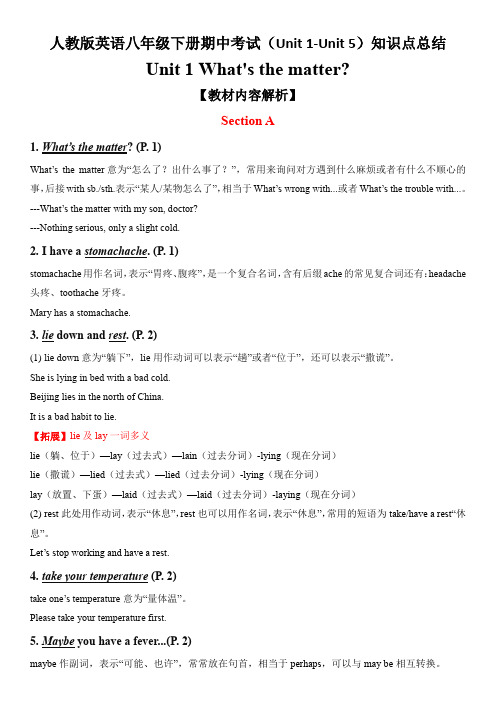
人教版英语八年级下册期中考试(Unit 1-Unit 5)知识点总结Unit 1 What's the matter?【教材内容解析】Section A1.What’s the matter? (P. 1)What’s the matter意为“怎么了?出什么事了?”,常用来询问对方遇到什么麻烦或者有什么不顺心的事,后接with sb./sth.表示“某人/某物怎么了”,相当于What’s wrong with...或者What’s the trouble with...。
---What’s the matter with my son, doctor?---Nothing serious, only a slight cold.2.I have a stomachache. (P. 1)stomachache用作名词,表示“胃疼、腹疼”,是一个复合名词,含有后缀ache的常见复合词还有:headache 头疼、toothache牙疼。
Mary has a stomachache.3.lie down and rest. (P. 2)(1)lie down意为“躺下”,lie用作动词可以表示“趟”或者“位于”,还可以表示“撒谎”。
She is lying in bed with a bad cold.Beijing lies in the north of China.It is a bad habit to lie.【拓展】lie及lay一词多义lie(躺、位于)—lay(过去式)—lain(过去分词)-lying(现在分词)lie(撒谎)—lied(过去式)—lied(过去分词)-lying(现在分词)lay(放置、下蛋)—laid(过去式)—laid(过去分词)-laying(现在分词)(2)rest此处用作动词,表示“休息”,rest也可以用作名词,表示“休息”,常用的短语为take/have a rest“休息”。
初中英语人教版期中复习 八年级下册 Units1-2_知识梳理和复习
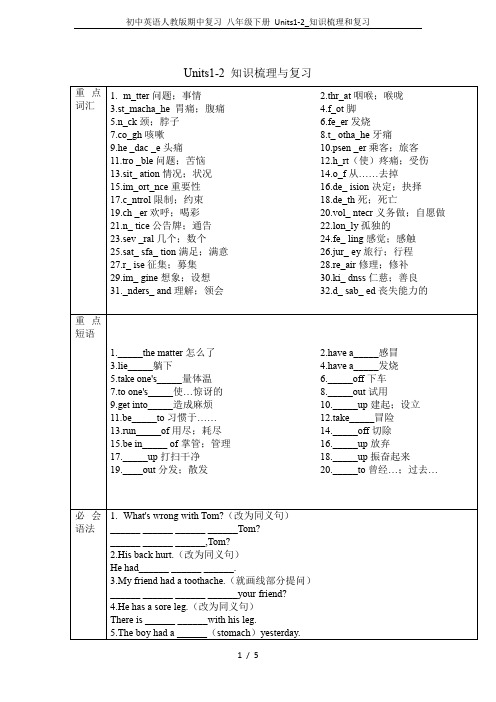
Units1-2 知识梳理与复习一、根据句意及首字母或汉语提示填写单词。
1.If you have a ______(牙疼),you should see the dentist.2.His mother is a teacher.She often has a sore ______(喉咙).3.We had too much ______(麻烦)in finding his new house.4.My computer didn't work. Can you help me r ______ it?5.The plane got out of c ______ and it hit a tree.6.Miss Tan is a chicken(胆小鬼)and she isn't willing to take r ______.7.Now,very few students u ______ their parents. They always have their thoughts(想法)8.Sometimes we can have the different ______(感觉)about the same thing.9.No one can ______(想象)what the world will be like in 100 years.10.The old man's sons live in the city and he feels very ______(孤独的).二、用所给单词的适当形式填空。
1.Lucy is only ten years old, but she can look after ______ (she).2.-I have a ______(head).What should I do?-I think you had better have a rest.3.We were ______(excite)about the movie-Lost in Thailand.4.How many ______ (foot)does the animal have?5.I have lots of ______ (difficult)in English. Can you help me?6.He ate too much food, so he had a ______(stomach).7.Hawking is a ______(disable)man, but he is a famous scientist.2.The boy was very sad about his grandfather's ______.3.They make a ______ to study hard next year4.More and more people know the ______of health.5.Everyone wants to get ______out of his or her job.6.Li Ping gave his money to the stay-behind children and the children thanked him for his ______.7.We found a new iPhone 5. Do you know the ______of it?8.After many years of ______,Li Yugang became a famous singer.四、根据所给中文意思完成句子,每空一词。
新人教版八年级英语下册期中复习1-6单元知识归纳总结

八年级英语下册各知识点归纳总结Unti1 what’s the matter?短语归纳1.too much 太多2.lie down 躺下3.get an X-ray 做个X光检查4.take one ’s temperature 量体温5.put some medicine on ......在....上敷药6.have a fever 发烧7. get off 下车 8. think twice再三考虑without thinking twice 没多想9.take breaks /take a break 休息 10.take sb to the hospital 送某人去医院11.wait for等待12.to one’s surprise 使.......惊讶的13.thanks to多亏于;由于 14.in time及时 on time按时15.think about 考虑 16.have a heart problem患有心脏病17.get into the trouble 遇到麻烦 18.do the right thing做正确的事情事情19.fall down 摔倒 20.put ...... on sth把...放在某物上21.get hit/sunburned 摔伤/烧伤 22.be interested in 对.....感兴趣be used to 习惯于.... 24.take risks/take a risk 挑战25.lose one’s life 失去生命 26. save one’s life27.run out of 用完 28.cut off 切除29.get out of 从...出来 30.make a decision/decisions 做决定31.be in control of 掌管;管理 32.give up 放弃33. have a stomachache 3. see sb. do sth. 34. shout for help35. expect (sb.) to do sth. 36.have a sore throat嗓子疼37.have a cold感冒 38.have a sore back后背疼39.have a stomachache胃痛 40。
期中备考-人教版八年级下册unit 2核心考点归纳(语法+短语+语句分析)

期中备考-人教版八年级下册unit 2核心考点总结归纳【语法】一、作主语为避免句子头重脚轻,常用it作为形式主语,而真正主语--动词不定式后置。
常用句型:It takes sb. some time to do sth.It +be+adj./n.+(for/of sb.) to do sth.(此句型注意使用介词for和of的区别:用“for”时表示“对于某人来说,做某事是怎样的”,此时的形容词修饰sth;用“of”时表示“某人做某事,某人是怎样的”,此时的形容词修饰sb.)Eg.It took me three hours to finish my homework.It’s difficult for me to finish this alone.It’s kind of you to help me when I was in trouble.二、作宾语动词agree ;offer ;intend,plan ;help;prepare ;decide ;refuse ;choose ;wish,hope,want,expect ;fail ;demand,ask (要求);promise (答应);pretend (假装);dare (敢于);manage (设法做成);determine (决心)等后面常接动词不定式作宾语。
【记忆口诀】同意提出做计划,要求答应来帮忙。
准备决定遭拒绝,敢于选择有希望。
不能做到莫假装,设法做成决心强。
Eg.I plan to go to Sydney together with my parents next week.三、作(后置)定语“have/has+sth.+to do”或“enough+名+to do” “It’s time to do sth.” 等结构。
Eg.I have something important to do.It’s time to tidy up your own room.四、作宾语补足语tell, ask, want, invite, teach, like, call等可接带to的动词不定式作宾语补足语,构成tell/ask/want /call/invite sb. to do sth.结构。
人教版八年级英语下册各单元知识点汇总
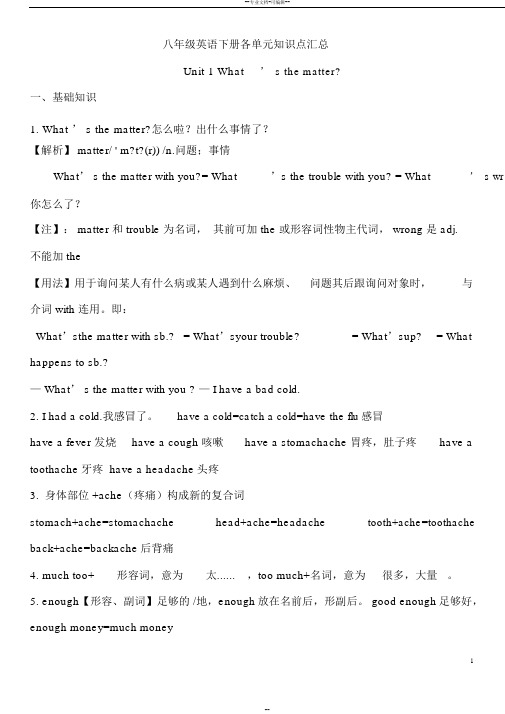
--专业文档-可编辑--八年级英语下册各单元知识点汇总Unit 1 What’ s the matter?一、基础知识1.What ’ s the matter?怎么啦?出什么事情了?【解析】 matter/ ' m?t?(r)) /n.问题;事情What’ s the matter with you?= What’s the trouble with you? = What’ s wr 你怎么了?【注】: matter 和 trouble 为名词,其前可加 the 或形容词性物主代词, wrong 是 adj.不能加 the【用法】用于询问某人有什么病或某人遇到什么麻烦、问题其后跟询问对象时,与介词 with 连用。
即:What’sthe matter with sb.? = What’syour trouble?= What’sup? = What happens to sb.?— What’ s the matter with you ? — I have a bad cold.2. I had a cold.我感冒了。
have a cold=catch a cold=have the flu感冒have a fever 发烧have a cough 咳嗽have a stomachache 胃疼,肚子疼have a toothache牙疼 have a headache头疼3.身体部位 +ache(疼痛)构成新的复合词stomach+ache=stomachache head+ache=headache tooth+ache=toothache back+ache=backache后背痛4. much too+形容词,意为太......,too much+名词,意为很多,大量。
5.enough【形容、副词】足够的 /地,enough放在名前后,形副后。
good enough足够好,enough money=much money6. lie down 躺下, lie 躺,躺着,过去式lay;lie 说谎,过去式 lied7. maybe 或―许‖,常用于句首,表示可能性,后加句子。
人教版八年级下册Unit1-5 (期中)知识点归纳与总结

已排版好可直接打印使用巧思妙解提升思维能力Unit1-5知识点归纳与总结Unit1Where did you go on vacation?一、重点单词复合不定代词:(anyone,anywhere,something,nothing,everyone,someone);wonder,wonderful;反身代词:(myself;yourself);few;most;bored;decide;try;difference;enough;below,umbrella二、重点短语1.go on vacation去度假2.too many太多(后跟可数名词复数)3.quite a few相当多4.study for a test为考试学习5.taste good尝起来味道好6.have a good time=have fun玩得开心7.of course当然可以8.feel like感觉像……/想要9.something important重要的事情10.because of因为(+名词,代词或名词性词)11.most of the time大多数时间12.arrive in到达13.Long time no see好久不见14.keep a diary写日记15.go to the mountains去爬山16.go to the beach到海边去17.visit the museums参观博物馆18.go to summer camp去夏令营19.go out出去20.go shopping购物21.in the past在过去22.walk around四处走走23.one bowl of rice一碗米饭24.find out查出来/发现25.go on继续26.stay at home呆在家27.take photos照相28.up and down上上下下e up升起,出来三、习惯用法、搭配1.buy sth.for sb./buy sb.sth.为某人买某物(sb.某人;sth.某物)★2.taste+adj.尝起来……(adj.形容词)3.arrive in+大地方/arrive at+小地方到达某地★4.decide to do sth.决定做某事(to do表示动词不定式,就是在动词原形前加to)★5.try doing sth.尝试做某事/try to do sth.尽力做某事6.enjoy doing sth.喜欢做某事7.want to do sth.想去做某事8.start doing sth.=start to do sth开始做某事9.stop doing sth.停止做某事10.look+adj看起来11.dislike doing sth.不喜欢做某事12.Why not do sth.?=Why don’t you do sth?为什么不做…….呢?13.so+adj+that+从句如此……以至于……★14.tell sb.(not)to do sth.告诉某人(不要)做某事15.keep doing sth.继续/不停做某事16.★16.forget to do sth.忘记去做某事/forget doing sth忘记做过某事四、重点句子--Where did you go on vacation?你到哪里去度假了?---I went to New York City.我去了纽约城--Did you go out with anyone?你和他人出去的吗?--No,No one was here.Everyone was on vacation.不,没有人在这儿。
人教版英语八年级期中考知识点总结

八年级期中知识点总结Unit1词形转换Interest—interesting (修饰物)Interest-interestedSomething— anything( 用在否定句和疑问句中) Activity — activities( 变复数 )Build-building(s)Different-difference(s)Enjoy-enjoyableWonder-wonderful反身代词使用Like-dislike动词应用 :1.非谓语用法:Decide to do seem to do try to do feel likeenjoy doing go +doing( 例如 go shopping)There is nothing to do but do( 动词原形 ).2.谓语动词注意过去时态易错的动词过去式:See-saw stop— stopped take— took eat— ate get-got 重点短语用法:take quite a few photosdo something specialtaste/feel/smell/sound/look + 形容词enough+名词形容词 /副词 +enoughwith excitementcome uphave a great timebuy sth for sbstudy for tests重点句子:1.There was nothing to do in the evening but read.2.No one seemed to be bored.3.Everything tasted really good.4.I wonder what life was like here in the past. doing dislike doing keep doing feel —felt feed-fedUnit2词形转换:health-healthy one— once two — twice tooth — teeth little —least(at least)write — writer(s) magazine-magazines hard— hardly( 几乎不)housework— housework ( 不可数 )动词应用:1.非谓语:It is + 形容词to do例如: It is good to relax by using the Internet.The best way to do a good way to do例如: I think the best way to spend free time is through exercise.Want sb to do ask sb to doWhat about doing such as doing by doing介词(about,as,by)后面+doing人+ spend(花费 ) +时间 (in) doing2. 谓语:第二单元注意一般现在时,一般现在时标志词:频率副词always usually often sometimes hardly ever seldom never evey⋯ once a week twice⋯Three... times a week how often一般现在时注意谓语动词变化,当主语是第三人称时,注意三单变化。
人教版八年级下英语期中复习知识点讲义(Unit1-Unit5)-精

Unit1:What’s the matter?一.语法重点1.情态动词should的用法2.反身代词二.作文话题:谈论健康三.重要词汇句型1.have a +疾病名词(得了......病)2.询问病人病情的句型(也可用于发生了什么事)What’s wrong?What’s wrong with you?What’s your trouble?What’s the trouble with you?What’s wrong?3.4.If引导Array的条件状语从句(主将从现)5.surprise:(1)surprise sb.吓到某人(2)be surprised at对......感到吃惊(3)be surprised to do sth.做某事令人感到吃惊(4)in surprise惊奇地6.agree:(1)agree to do sth. 同意做某事(2)agree with sb. 同意某人(3)agree on sth.双方就某事达成一致(4)agree that+that从句同意......7.trouble:(1)get into trouble陷入困境(2)be in trouble处于困境(3)get sb. into trouble使某人陷入困境(4)have trouble with sth.在某事方面有困难(5)have trouble (in) doing sth.在做某事方面有困难e(1)be/get used to doing sth.习惯于做某事(2)used to do sth.过去常常做某事(3) sth. be used to do......某物被用来做(表被动关系)......(4)sth. be used for doing sth.某物用于/被用于做某事(强调用途)9.take a risk/take risks冒险at risk在危险中at the risk of doing sth.冒生命危险做某事10.run out(花光:物作主语)run out of(人作主语)=use up11.mean to do sth.打算做某事mean doing sth.意味着做某事12.important(adj.)----unimportant(adj.不重要的)----importance(n.)13.be in control of 掌管,控制14.cut词组:1. cut out删除;删去 2. cut up切碎 3. cut off切掉;停止 4. cut down砍到;降低 5. cut in插嘴;超车;插队Unit2: I’ll help to clean up the city parks.一.语法重点1.动词不定式2.动词短语二.作文话题:提供帮助,义务活动三.重要词汇句型1.volunteer:v.自愿(做某事)volunteer to do sth. volunteer for sth.n. 志愿者adj. 志愿的;自愿的 a volunteer job2.疑问词+动词不定式=宾语从句I really can’t decide where I should go.=I really can’t decide where to go.3.such+a(n) +形容词+名词=so+形容词+a(n)+名词She is such a beautiful girl.=She is so beautiful a girl.4.satisfaction(n.满意)--satisfy(v.使满意)--satisfied(adj.满意的)--satisfying(令人满意的)to one’s satisfaction使/令某人满意/满足be satisfied with对......感到满意be satisfied to do sth. 对做某事感到满意5.raise...for...为...筹集...6.look like外表上看起来像take after指因血缘关系在性格,性格,行为上相像7.make/think/find/believe/feel it +形容词+to do sth. 使/觉得/发现/相信/感觉做某事......8.make a difference to对......产生影响9.imagine: (1)imagine doing sth.想象做某事(2)imagine sb. to do sth.想象某人做某事(3)imagine that/what 想象......10.train: v. 训练n. 火车training n.训练;培训(1)train sb./sth. to do sth.训练某人/某物去做某事(2)train sb. in sth. 在某方面训练/培养某人11.understand=follow=catch理解;听懂understanding adj.善解人意的;体谅人的12.change v. 改变;变化change one’s life change...into...n. 零钱(不可数名词)改变(可数名词changes)13.短语:cheer up (使)变得高兴;振奋起来give out分发;散发come up with想出;提出put off推迟hand out分发call up打电话给某人;征召care for照顾;非常喜欢try out 参加.....选拔;试用fix up修理;装饰give away赠送;捐赠take after(外貌或行为)像Unit3:Could you please clean your room?一.语法重点1.情态动词could用法(请求和征求许可)二.作文话题:对某事某物的看法(议论文)三.重要词汇句型1.in a mess乱糟糟;一团糟make a mess of (doing) sth. 把(做)某事搞得一团糟2.so +助动词/系动词/情态动词+主语(也)neither助动词/系动词/情态动词+主语(也不)He will go to Hangzhou for a holiday tomorrow. So will I.3.pass v. 经过;穿过pass the supermarket通过(考试;会议);合格或者及格pass the final exam(时间的)过去,流逝 A year passed quickly.4.borrow sth. borrow sth. from sb. (借进:说话人向别人借东西)lend sb. sth. lend sth. to sb. (借出:说话人把自己的东西借给别人keep“借”或“保留”多长时间,与一段时间连用5.make:(1)make sb. do sth. I made my mother laugh.(2)make+宾语+形容词(宾语补足语)I made my mother sad.6.waste: a waste of 浪费 a waste of moneywaste sth.浪费某物waste sth. in doing sth.浪费......做某事7.provide 提供;供应provide sb. with sth.= provide sth for sb.supply sb. with sth.=supply sb. with sth.offer sb. sth=offer to do sth.8.develop(v.发展)--developed(adj.发达的)--developing(adj.发展中的)--development(n.发展)develop one’s interest in培养某人对......的兴趣9.drop与fall 落下;掉下;降下(作不及物动词时,一般可互换)drop还可作及物动词,而fall 不可10.短语:depend on依靠;依赖take care of 照顾;处理Unit4: Why don’t you talk to your parents?一.语法重点1.提建议和回答提建议的表达方式2.until, so that及although引导的状语从句二.作文话题:就某一现象提建议三.重点词汇句型1.allow sb. to do sth.允许某人做某事allow doing sth.允许做某事2.find sb. doing sth.发现某人正在做某事find sb. to do sth. 发现某人做了某事3.get on (well/badly)with sb. 与某人相处的好/坏4.argue with sb. about sth. 为某事与某人争论5. instead与instead of7.offer to do sth.主动提出做某事offer sb. sth.=offer sth. to sb.给某人提供某物municate with sb.与某人沟通,交流communicate sth. to sb.把......通知/传达给某人9.return sb. sth= return sth. to sb.=give back10.not ...any more(不再)=no morenot...any longer=no longer(不再)11.put pressure on sb.向某人施压pete with/against sb.和某人竞争13.continue/go on doing sth.继续做同一件事continue/go on to do sth.继续做某事(不是同一件事)pare A with B把A与B做对比/比较(用来比较相似事物的不同点)compare A to B把A比作B(用来比较不同事物间的相同点)16.cause sb. to do sth.促使某人做某事cause sth. (to/for sb.)(给某人)带来......17. 词组:look through快速查看;浏览work out成功的发展;解决get on with和睦相处;关系良好cut out删除;删去compare...with比较;对比Unit5: What were you doing when the rainstorm came?一.语法重点1.过去进行时2.when与while的区别二.作文话题:描述过去发生的某件事三.重点词汇句型1.light: 1)n. 光;光线(不可数名词)2)n. 电灯;光源(可数名词)3)adj.轻的;浅色的4)v. 点燃;照亮light---lighted/lit---light/lit2.report v.报告n. 报告reporter n. 记者3.wood n. 木头;木(不可数名词)小树林(可数名词,常用复数)wooden adj.木制的4.beat 1)v. 击打2)心脏等跳动3)打败;战胜(后接人或由人组成的队)5.against 1)反对for支持We are against war and for peace.2)靠着,倚着The boy stood against the door.6.rise与raise2)实现(梦想、愿望)realize one’s dream=make one’s dream come true=achieve one’s dream8.make one’s way to......在某人去......的路上,前往......途中9.短语:at first 起初;起先fall asleep进入梦乡;睡着die down逐渐变弱;逐渐消失make one’s way前往;费力地前进take down拆除,往下拽;记录go off水电断掉;离开;爆炸;食物变坏。
人教版八年级下册第3单元期中复习知识点
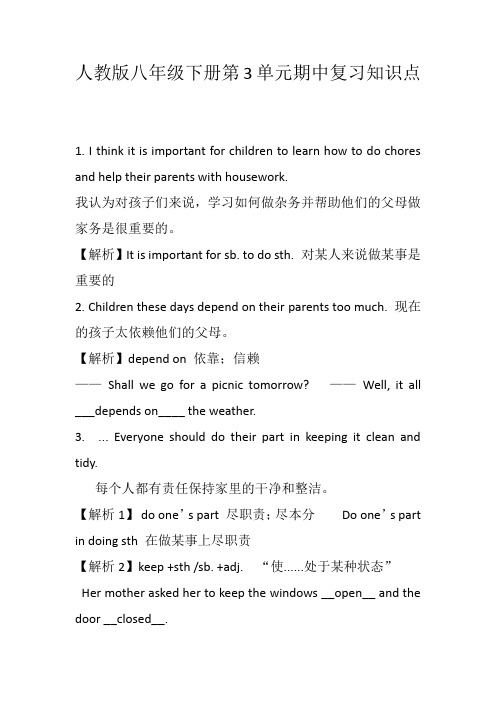
人教版八年级下册第3单元期中复习知识点
1. I think it is important for children to learn how to do chores and help their parents with housework.
我认为对孩子们来说,学习如何做杂务并帮助他们的父母做家务是很重要的。
【解析】It is important for sb. to do sth. 对某人来说做某事是重要的
2. Children these days depend on their parents too much. 现在的孩子太依赖他们的父母。
【解析】depend on 依靠;信赖
——Shall we go for a picnic tomorrow? ——Well, it all ___depends on____ the weather.
3. ... Everyone should do their part in keeping it clean and tidy.
每个人都有责任保持家里的干净和整洁。
【解析1】do one’s part 尽职责;尽本分Do one’s part in doing sth 在做某事上尽职责
【解析2】keep +sth /sb. +adj. “使......处于某种状态”Her mother asked her to keep the windows __open__ and the door __closed__.。
人教版八年级英语下册期中复习知识点汇总

人教版八年级英语下册期中复习知识点汇总Unit2 I’ll help to clean up the city parks.【重点单词】clean up 打扫(清除)干净cheer [tʃiə] v. 欢呼cheer up 变得更高兴,振奋起来give out 分发,散发volunteer [ˌvɔlənˈtiə] n. & v. 志愿者;义务做come up with 想出,提出put off 推迟sign [saɪn] n. 标记,符号,标牌notice [ˈnəʊtɪs] n. & v. 通知,公告;注意到hand out 分发call up 打电话给…某人,征召used to do sth. 过去常常做某事lonely ['ləʊnlɪ] adj. 孤独的,寂寞的care for 照顾,非常喜欢several [ˈsevrəl] prep. 几个,数个,一些strong [strɒŋ] adj. 强壮的,强烈的feeling [ˈfi:lɪŋ] n. 感觉,感触satisfaction [ˌsætɪs'fækʃn] n. 满足,满意joy [dʒɔɪ] n. 高兴,愉快owner [ˈəʊnə(r)] n. 所有者,物主try out 参加…选拔,试用journey ['dʒɜ:nɪ] n. (尤指长途)旅行,行程raise [reɪz] v. 抬起,举起,筹集,征集alone [əˈləun] adv. 独自地,孤独地repair [riˈpɛə] v. 修理,修补fix [fiks] v. 修理,安装fix up 修理,修补give away 赠送,捐赠take after (外貌或行为)像broken ['brəʊkən] adj. 破损的,残缺的wheel [wi:l] n. & v. 轮子,车轮;旋转letter [ˈletə] n. 信件,字母Miss [mɪs] n. 小姐set up 建立,设立disabled [disˈeibəld] adj. 有残疾的make a difference 影响,有作用blind [blaɪnd] adj. 盲的,盲目的,失明的deaf [def] adj. 聋的imagine [ɪˈmædʒɪn] v. 想象,设想difficulty ['dɪfɪkəltɪ] n. 困难open [ˈəʊpən] v. 打开door [dɔ:] n. 门carry ['kærɪ] v. 携带,搬运train [treɪn] v. 训练,培养training [ˈtreɪnɪŋ] n. 训练,培训excited [ɪkˈsaɪtɪd] adj. 激动的,兴奋的kindness [ˈkaɪndnəs] n. 仁慈,善良,亲切clever [ˈklevə] adj. 聪明的,机灵的understand [ˌʌndəˈstænd] v. 懂,理解change [tʃeɪndʒ] n. & v. 改变interest ['ɪntrəst] n. & v. 感兴趣;兴趣sir [sɜ:(r)] n. 先生madam ['mædəm] n. 夫人,女士。
- 1、下载文档前请自行甄别文档内容的完整性,平台不提供额外的编辑、内容补充、找答案等附加服务。
- 2、"仅部分预览"的文档,不可在线预览部分如存在完整性等问题,可反馈申请退款(可完整预览的文档不适用该条件!)。
- 3、如文档侵犯您的权益,请联系客服反馈,我们会尽快为您处理(人工客服工作时间:9:00-18:30)。
人教版英语八年级下册期中复习单元知识点盘点
Unit 2 I’ll help to clean up the city parks
15. keep【动词】keep+名词,保留(某物);keep+形容词,保持
16.【形容词】broken破损的,出毛病的;
blind瞎的,失明的;deaf聋的;disabled有残疾的,丧失能力的;在句中做定语和表语。
17.make it possible (for sb.) to do sth.使(某人)做某事成为可能,You helped to make it possible for me to have Lucky.
make it +形容词(+for sb.) to do sth. 使(某人)做某事成为…;
think/find it +形容词to do sth.
18. make a difference to…对……有影响;对……有作用,difference 前可以用no, any, some, much等修饰,如
The rain made no difference to the game.
Hard-working makes much difference to study.
19. difficulty【可数/不可数】表示抽象意义的“困难”时为不可数;表示具体的“难题、难事”时为可数;
have difficulty (in) doing sth.
= have trouble (in) doing sth. 做某事有困难
20. train【动词】训练,trained为过去分词,可做定语,意为“受过训练的”a trained dog。
